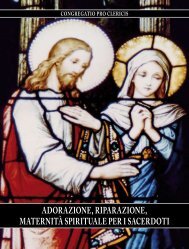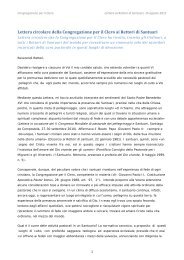La lingua nella liturgia di Rito Romano latino e lingua volgare
La lingua nella liturgia di Rito Romano: latino e lingua volgare
La lingua nella liturgia di Rito Romano: latino e lingua volgare
- No tags were found...
Create successful ePaper yourself
Turn your PDF publications into a flip-book with our unique Google optimized e-Paper software.
It is a remarkable phenomenon that many religions of the world, or major branches of them, hold on to a language as dear to them.We cannot think of the Jewish religion without Hebrew. Islam holds Arabic as sacred to the Qur'an. Classical Hinduism considersSanskrit its official language. Buddhism has its sacred texts in Pali.It would be superficial to <strong>di</strong>smiss this tendency as esoteric, or strange, or outmoded, old or me<strong>di</strong>eval. That would be to ignore a fineelement of human psychology. In religious matters, people tend to hold on to what they received from the beginning, how theirearliest predecessors articulated their religion and prayed. Words and formulae used by earlier generations are dear to those whotoday inherit from them. While a religion is of course not identified with a language, how it understands itself can have an affectivelink with a particular linguistic expression in its classical period of growth.3. Advantages of <strong>La</strong>tin in the Roman LiturgyAs was mentioned above, by the fourth century, <strong>La</strong>tin had replaced Greek as the official language of the Church of Rome.Prominent among the <strong>La</strong>tin Fathers of the Church who wrote extensively and beautifully in <strong>La</strong>tin were St Ambrose (339‐397), StAugustine of Hippo (354‐430), St Leo the Great († 461) and Pope Gregory the Great (540‐604). Pope Gregory, in particular, brought<strong>La</strong>tin to a great height in the sacred liturgy, in his sermons and in general Church use.The Roman Rite Church showed extraor<strong>di</strong>nary missionary dynamism. This explains why a greater part of the world has beenevangelized by heralds of the <strong>La</strong>tin Rite. Many European languages which we regard as modern today have roots in <strong>La</strong>tin, somemore than others. Examples are Italian, Spanish, Romanian, Portuguese and French. But even English and German do borrow from<strong>La</strong>tin.The Popes and the Roman Church have found <strong>La</strong>tin very suitable for many reasons. It fits a Church which is universal, a Church inwhich all peoples, languages and cultures should feel at home and no one is regarded as a stranger.Moreover, the <strong>La</strong>tin language has a certain stability which daily spoken languages, where words change often in shades of meaning,cannot have. An example is the translation of the <strong>La</strong>tin "propagare". The Congregation for the Evangelization of Peoples when itwas founded in 1627 was called "Sacra Congregatio de Propaganda Fide". But at the time of the Second Vatican Council manymodern languages use the word "propaganda" in the sense in which we say "political propaganda". Therefore, there is a preferencein the Church today to avoid the expression "de propaganda Fide", in favour of "the Evangelization of Peoples".<strong>La</strong>tin has the characteristic of words and expressions retaining their meaning generation after generation. This is an advantagewhen it comes to the articulation of our Catholic faith and the preparation of Papal and other Church Documents. Even the modernuniversities appreciate this point and have some of their solemn titles in <strong>La</strong>tin.Blessed Pope John XXIII in his Apostolic Constitution, Veterum Sapientia, issued on 22 February 1962, gives these two reasons andadds a third. The <strong>La</strong>tin language has a nobility and <strong>di</strong>gnity which are not negligible (cf. Veterum Sapientia, nn. 5, 6, 7). We can addthat <strong>La</strong>tin is concise, precise and poetically measured.Is it not admirable that people, especially well‐trained clerics, can meet in international gatherings and be able to communicate atleast in <strong>La</strong>tin? More importantly, is it a small matter that 1 million young people could meet in the World Youth Day Convention inRome in 2000, in Toronto in 2002 and in Cologne in 2005, and be able to sing parts of the Mass, and especially the Credo, in <strong>La</strong>tin?Theologians can study the original writings of the early <strong>La</strong>tin Fathers and of the Scholastics without tears because these werewritten in <strong>La</strong>tin.It is true that there is a tendency, both in the Church and in the world at large, to give more attention today to modern languages,like English, French and Spanish, which can help one secure a job quicker in the modern employment market or in the Ministry ofForeign Affairs in their country.But the exhortation of Pope Bene<strong>di</strong>ct XVI to the students of the Faculty of Christian and Classical Letters of the Pontifical SalesianUniversity of Rome, at the end of the Wednesday General Au<strong>di</strong>ence of 22 February 2006, retains its vali<strong>di</strong>ty and relevance. And hepronounced it in <strong>La</strong>tin! Here is my free English translation: "Quite rightly our Predecessors have urged the study of the great <strong>La</strong>tinlanguage so that one may learn better the saving doctrine that is found in ecclesiastical and humanistic <strong>di</strong>sciplines. In the same waywe urge you to cultivate this activity so that as many as possible may have access to this treasure and appreciate its importance" (inL'Osservatore <strong>Romano</strong>, 45, 23 February 2006, p. 5).4. Gregorian Chant"Liturgical action is given a more noble form when sacred rites are solemnized in song" (SC, n. 113). There is an ancient saying: bisorat qui bene cantat, that is, "the person who sings well prays twice". This is so because the intensity that prayer acquires frombeing sung, increases its ardour and multiplies its efficacy (cf. Paul VI: Address to Italian Schola Cantorum, 25 September 1977, inNotitiae 136, November 1977, p. 475).Good music helps to promote prayer, to raise the minds of people to God and to give people a taste of the goodness of God.








